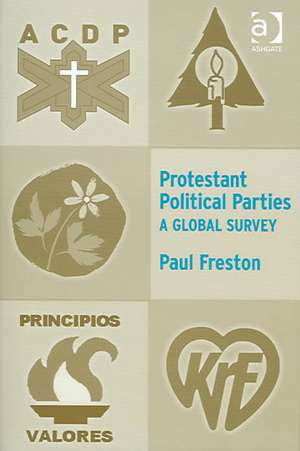Protestant Political Parties: A Global Survey
Autor Paul Frestonen Limba Engleză Hardback – 13 sep 2004
Preț: 765.04 lei
Preț vechi: 1027.91 lei
-26% Nou
Puncte Express: 1148
Preț estimativ în valută:
146.39€ • 153.25$ • 121.13£
146.39€ • 153.25$ • 121.13£
Carte tipărită la comandă
Livrare economică 05-19 aprilie
Preluare comenzi: 021 569.72.76
Specificații
ISBN-13: 9780754640622
ISBN-10: 0754640620
Pagini: 184
Dimensiuni: 156 x 234 x 19 mm
Greutate: 0.5 kg
Ediția:1
Editura: Taylor & Francis
Colecția Routledge
Locul publicării:Oxford, United Kingdom
ISBN-10: 0754640620
Pagini: 184
Dimensiuni: 156 x 234 x 19 mm
Greutate: 0.5 kg
Ediția:1
Editura: Taylor & Francis
Colecția Routledge
Locul publicării:Oxford, United Kingdom
Cuprins
Contents: Introduction: Protestant political parties in global perspective: Political parties, religion and Protestantism; Three waves of Protestant parties; Problematizing Protestant parties. The European Heartland: The Netherlands; Switzerland; Germany. Scandinavia And The Baltic: Scandinavia; Norway; Sweden; Denmark; Finland; The Baltic Republics; Latvia; Estonia. The English-Speaking World: The United Kingdom; Canada; New Zealand; Australia. Asia And The Pacific: The Third World; Fiji; Korea; Indonesia; India; Pakistan. Africa: Sub-Saharan Africa; Namibia; Zambia; South Africa; Latin America (I): Latin America; Nicaragua; Colombia; Venezuela. Latin America (II): Costa Rica; Guatemala; Bolivia; El Salvador; Mexico; Argentina; Peru; Chile; Panama; Dominican Republic; Paraguay; Ecuador; Brazil (and Portugal). Conclusion; Bibliography; Index.
Recenzii
'I think it would be true to say that nobody else has Paul Freston's grasp of this complex and growing field. He has a firm grasp of complicated issues, a grounding in contemporary political sociology, and a capacity to present data and argument clearly'. David Martin, Emeritus Professor of Sociology, LSE '... a valuable resource for understanding the diverse range of Protestant movements throughout the world. Freston writes in a non-academic fashion which makes the book accessible to the general reader.' DenkWijzer ’Freston's portrayal is an achievement that I think virtually nobody else could pull off. It is rare that a scholar will be motivated enough to collect this much information about obscure and distant efforts at religious politics without having a strong agenda of his own... Protestant Political Parties, like Freston's previous work, pushes us to stop reading the past into the present, and instead develop our theorizations from complex emprical reality.’ Sociology of Religion ’... this volume appears destined to become the standard work on the subject.’ Evangelical Review of Society and Politics
Notă biografică
Paul Freston is Professor of Sociology at the Federal University of Sao Carlos, Brazil.
Descriere
The recent global expansion of Protestant Christianity, and the increase in multiparty democracies, has led to the multiplication of Protestant political parties. One cannot talk of Protestant parties today without mentioning countries as diverse as Norway, Latvia, New Zealand, Indonesia, Zambia and Nicaragua. Whilst the well-established parties of the Netherlands and Scandinavia have long been studied, Paul Freston's groundbreaking book is the first global survey of this phenomenon. After looking at the traditional Protestant heartlands of Europe and the English-speaking world, Freston traces the spread of the Protestant party model to post-communist countries, the Pacific, the Muslim world, southern Africa and Latin America. He examines the circumstances favouring such parties, and the political projects they represent. The conclusion analyses the diversity of Protestant parties due to different interpretations of Christian politics and varied contexts. This unique book will interest specialists and non-specialists, across disciplines and in many parts of the world.
